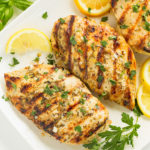This word “metabolism” is thrown around a lot these days.
You know that if yours is too slow you might gain weight. But what exactly does this all mean?
Well technically “metabolism” is the word to describe all of the biochemical reactions in your body. It’s how you take in nutrients and oxygen and use them to fuel everything you do.
Your body has an incredible ability to grow, heal, and generally stay alive. And without this amazing biochemistry you would not be possible.
Metabolism includes how the cells in your body:
- Allow activities you can control (e.g. physical activity etc.).
- Allow activities you can’t control (e.g. heart beat, wound healing, processing of nutrients & toxins, etc.).
- Allow storage of excess energy for later.
so when you put all of these processes together into your metabolism you can imagine that these processes can work too quickly, too slowly, or just right.
Which brings us to the “metabolic rate”.
Metabolic rate
This is how fast your metabolism works and is measured in calories (yup, those calories!).
The calories you eat can go to one of three places:
- Work (i.e. exercise and other activity).
- Heat (i.e. from all those biochemical reactions).
- Storage (i.e. extra leftover “unburned” calories stored as fat).
As you can imagine the more calories you burn as work or creating heat the easier it is to lose weight and keep it off because there will be fewer “leftover” calories to store for later.
There are a couple of different ways to measure metabolic rate. One is the “resting metabolic rate” (RMR) which is how much energy your body uses when you’re not being physically active.
The other is the “total daily energy expenditure” (TDEE) which measures both the resting metabolic rate as well as the energy used for “work” (e.g. exercise) throughout a 24-hour period.
What affects your metabolic rate?
In a nutshell: a lot!
The first thing you may think of is your thyroid. This gland at the front of your throat releases hormones to tell your body to “speed up” your metabolism. Of course, the more thyroid hormone there is the faster things will work and the more calories you’ll burn.
But that’s not the only thing that affects your metabolic rate.
How big you are counts too!
Larger people have higher metabolic rates; but your body composition is crucial!
As you can imagine muscles that actively move and do work need more energy than fat does. So the more lean muscle mass you have the more energy your body will burn and the higher your metabolic rate will be. Even when you’re not working out.
This is exactly why weight training is often recommended as a part of a weight loss program. Because you want muscles to be burning those calories for you.
The thing is, when people lose weight their metabolic rate often slows down which you don’t want to happen. So you definitely want to offset that with more muscle mass.
Aerobic exercise also temporarily increases your metabolic rate. Your muscles are burning fuel to move so they’re doing “work”.
The type of food you eat also affects your metabolic rate!
Your body actually burns calories to absorb, digest, and metabolize your food. This is called the “thermic effect of food” (TEF).
You can use it to your advantage when you understand how your body metabolizes foods differently.
Fats, for example increase your TEF by 0-3%; carbs increase it by 5-10%, and protein increases it by 15-30%. By trading some of your fat or carbs for lean protein you can slightly increase your metabolic rate.
Another bonus of protein is that your muscles need it to grow. By working them out and feeding them what they need they will help you to lose weight and keep it off.
And don’t forget the mind-body connection. There is plenty of research that shows the influence that things like stress and sleep have on the metabolic rate.
This is just the tip of the iceberg when it comes to metabolism and how so many different things can work to increase (or decrease) your metabolic rate.
Lemon Herb Roasted Chicken Breasts
Ingredients
- 2 lemons , sliced
- 1 tablespoon rosemary
- 1 tablespoon thyme
- 2 cloves garlic , thinly sliced
- 4 chicken breasts (boneless, skinless)
- dash salt & pepper
- 1 tablespoon extra virgin olive old
Instructions
- Preheat oven to 425F. Layer ½ of the lemon slices on the bottom of a baking dish. Sprinkle with ½ of the herbs and ½ of the sliced garlic.
- Place the chicken breasts on top and sprinkle salt & pepper. Place remaining lemon, herbs and garlic on top of the chicken. Drizzle with olive oil. Cover with a lid or foil.
- Bake for 45 minutes until chicken is cooked through. If you want the chicken to be a bit more “roasty” then remove the lid/foil and broil for another few minutes (watching carefully not to burn it).
- Serve & enjoy!
Notes
Would you like more information about how Homeopathy and Nutrition can help you reach your health and wellness goals? Appointments available in person or via Skype.
Call Yoga Source 905-830-9700 TODAY to reserve your FREE 15 minute Introductory with Christine Moran, or book online with C Moran:
Powered by Appointment-Plus
Discover your path to harmony. Together we will identify the most powerful actions to help move you towards the health you desire and deserve.
References:
www.precisionnutrition.com/all-about-energy-balance
www.authoritynutrition.com/10-ways-to-boost-metabolism/
The health-related information on the harmonyhousewellness.ca website is meant for basic informational purposes only. It is not intended to serve as medical advice, substitute for a doctor’s appointment or to be used for diagnosing or treating a disease. Users of this website are advised to consult with their health care provider before making any decisions concerning their health.


